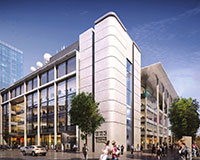Having just hosted the Nato conference, the world’s eyes were turned on Cardiff and the city took advantage. It went on a marketing attack, showing businesses and people just what the city had to offer – closeness to London, a skilled and growing workforce and several opportunities.
Cardiff is growing at an exponential rate. Over the next 20 years its population is set to explode, growing 26% – the highest increase in the UK. To be able to cope with that growth it needs to create a strong infrastructure and attract enough employers to create much-needed jobs.
Ken Poole, head of economic development at Cardiff city council, is a man with a plan. He is on a mission to prove that Cardiff is the next big thing.
“The time is right for Cardiff and other middleweight cities to grow,” says Poole.
With the electrification of its train line, the Welsh capital is getting ever closer to London. By 2017, the Big Smoke will be a mere 100 minute commute away. It is also one of 10 UK cities that will benefit from the introduction of ultrafast broadband over the next few years, which will not only make the city more attractive to the growing tech businesses that continue to drive growth in the UK but will also make Cardiff much more accessible on an international scale.
And that international attractiveness is already showing through, says Poole. Property investors from Germany, Kuwait, Israel and China have already started targeting the city, with the increasing prices in London pushing more and more overseas investors to the area.
“They see that they can get a bargain here but also that there is strong growth potential,” says Poole.
Grade-A property costs in Cardiff are among the lowest in the UK and the significant reductions in rent a tenant can get compared with London – coupled with that increasing closeness to the capital – is leading to rising interest from both occupiers and investors.
The city is responding. It is investing in more grade-A office space. Poole says Cardiff will see a growth in supply over the next few years, while most other regional cities are declining. More than 1m sq ft of office development is being planned as part of the Central Cardiff Enterprise Zone and, according to recent EG Planning Research figures, plans submitted for office schemes in the city rose by 38% in the year ended June 2014 as confidence in the Welsh capital continues to grow. By contrast, the number of office plans submitted across the rest of the UK regions dropped by 6%.
Poole says the biggest threat to Cardiff’s growth, however, is losing momentum.
“We have to gain the first advantage,” he says. “We have a skilled and growing workforce, we’re getting closer to London and are strategically placed to have the competitive edge.”
To make sure it builds on that competitive edge, the city council has launched the Cardiff Business Council, a new business-led organisation set up to grow the city’s private sector by marketing and promoting the region as a “world-class destination for business investment and tourism”.
The city already attracts hundreds of thousands of sporting tourists each year through its hosting of major world-class events at its Millennium Stadium – including football matches at the 2012 Olympics – and the 2015 Rugby World Cup is set to continue that trend.
But Poole is keen to promote the city as more than just a sporting hub. He cites the 1.4m sq ft St David’s shopping centre, owned by Land Securities and Intu, as a major retail attraction in the city and the BBC’s decision to move its headquarters to Rightacres’ Capital Square as a large-scale vote of corporate confidence in the city centre. The BBC HQ plans will unlock 100,000 sq ft of speculatively developed space in the city and create a new square.
The BBC’s commitment also helps Cardiff dispel the myth that it is a traditional industrial city. Quite the opposite, it has a strong financial services occupier base and is growing its creative businesses all the time. Doctor Who, Casualty and Sherlock are all filmed in the BBC’s Cardiff studios and Poole is confident that the soon-to-be-introduced ultrafast broadband will continue to attract digital businesses, such as US-based cyber security business Alert Logic, to the city.
The key now is attracting and retaining the talent. Poole says some 40% of Cardiff’s working population is educated to degree level and that 50% of the student population of Wales is within 45 minutes of the city. Making sure those young, talented future workers look to Cardiff as a legitimate place to live, work and play is vital for its future growth.
“We are a city that is ready for growth,” says Poole. “We are well placed with a workforce that has capacity to grow and we are now aligning the skills of the people with the needs of business.”











